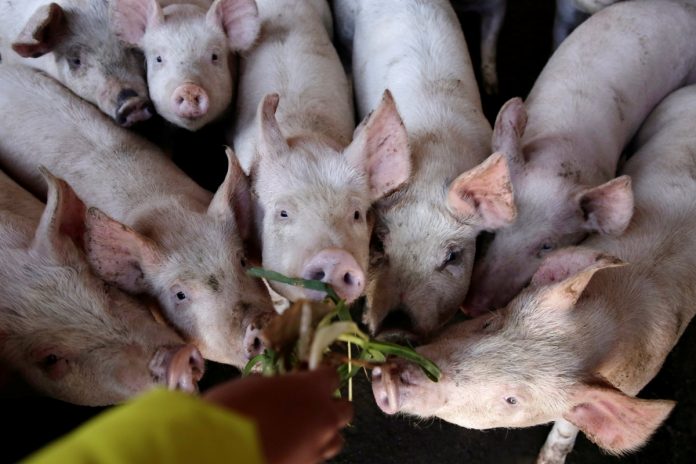
MANILA – Agriculture secretary Emmanuel “Manny” Piñol recently gave the assurance that there is no African swine fever in the country, while at the same time encouraging local hog raisers to ramp up their supply.
“Sa ngayon wala pa po so far [na African swine fever sa bansa], sa awa ng Diyos. Sana walang mangyari,” Piñol said in an interview.
Piñol said authorities have been vigilant against the possible entry of the virus in the country through importation of pork and processed pork products.
“Nag-deploy na po tayo ng mga meat-sniffing dogs, pero hihingi rin kami ng pondo para sa paglalagay ng mga karagdagang X-ray machines for meat and meat products sa major international airports para gawing mandatory ang X-ray ng kargamentong galing sa mga bansang apektado ng African swine fever,” he said.
The Food and Drug Administration had earlier banned the importation of pork from Vietnam, Zambia, South Africa, Czech Republic, Bulgaria, Cambodia, Mongolia, Moldova, and Belgium, expanding a Department of Agriculture memorandum order last September that had banned the importation of pork from ASF-hit countries China, Hungary, Latvia, Poland, Romania, Russia, and Ukraine.
The DA also called for the recall of processed pork in the market imported from ASF-hit countries, such as China.
“Ayon sa scientific studies, nagsu-survive ang ASF ng processing at saka heat,” he said.
The World Organization for Animal Health (OIE) defines African swine fever as a “severe viral disease affecting domestic and wild pigs.”
“This transboundary animal disease (TAD) can be spread by live or dead pigs, domestic or wild, and pork products,” said OIE.
Transmission can also occur via contaminated feed and non-living objects such as shoes, clothes, vehicles, knives, equipment due to the high environmental resistance of ASF virus.
Piñol said he has called for the ban on pork importation from countries with ASF as he cannot take chances for the virus to affect the local hog raising industry.
“Bakit ko naman isusugal ‘yung kapakanan ng ating hog industry sa maliit na volume ng importation? Kaya kinausap ko ‘yung mga importer, you have to understand na kapag napasok tayo ng ASF, sapok ang ating hog industry at libo-libong magsasaka ang mawawalan ng trabaho, not to mention economic problems it will cause us,” he said.
Local hog production
Piñol said the Department of Agriculture is encouraging local hog raisers to increase their production to meet the demands of the local market following the pork importation ban.
“We are expecting a surge in the demand for local pork products, hence an expected growth in the hog industry,” Piñol said in a separate text message to GMA News Online.
The pork importation ban could also benefit the chicken industry as Filipinos may look for another protein source, he said.
“Maaari po nating magamit ang opportunity na ito,” he said in the radio interview, adding that in the long term, the Philippines may even be the one to supply pork to other countries.
“Ayon sa mga siyentipiko, it will take decades for those countries with ASF to recover,” Piñol said.
“China has problems now in inflation. Instead of producing pork products, they are now importing,” he said.
“If we can handle this well, by closing our borders temporarily, magiging advantage sa atin ito. Magkakaroon ng puwang ang ating local hog raisers to supply the needs of the local market,” Piñol said.
The Agriculture secretary acknowledged that there will be slight increase in the prices of pork products as a result of the ban.
This is why he said the DA is now encouraging the production of more feeds to help boost the local hog raising industry.
“We are focusing now on the production of more feed grains,” Piñol said.
He added that Finance Secretary Carlos Dominguez “has approved our proposal na magdagdag ng 200,000 hectares na tataniman ngayong taon ng sorghum, 100,000 [hectares] at saka mais 100,000 [hectares] sapagkat ito ang kailangan natin to support our local hog and poultry industry,” he said. (GMA News)







